Economic growth in the current fiscal is expected to decline to 4.8%, from 5% in 2012-13 but it could recover to 5.8% in 2014-15, it said.
"The spillover effects of a weaker rupee have not significantly hurt India's creditworthiness, and hence would not trigger any rating action at this point," Fitch said in its report, 'India: Repercussions from the emerging markets sell-off'.
More From This Section
The agency has a 'stable outlook' on India's 'BBB-' sovereign rating.
The rupee declined close to 30% against the US dollar between April and August. It touched a record low of 68.85 against the American currency on August 28, but has recovered since then. It closed at 62.93 today.
The sharp depreciation of the Indian rupee in mid-2013 highlights the country's difficult transition following an extended period of low growth, high inflation and a widening in the CAD, Fitch said.
The ability to implement fiscal consolidation and continue with the overall economic adjustment process would be supportive developments for ratings, it said.
However, the government's resolve "to implement both tighter fiscal and monetary policies may still be tested as the general election approaches", it said. The election are due by May 2014.
Fitch said the government will heavily cut expenditures in the second half of the fiscal to trim fiscal deficit to 4.8% of GDP. The fiscal deficit in the first half of the fiscal has crossed 76% of budget estimates.
Fitch forecast CAD to decline to 3.1% of GDP in 2013-14. This fall, however, will not be enough to shield India from further pressures related to the eventual start of Fed tapering, it added.
The government expects to bring down CAD to below USD 56 billion, from last year's USD 88 billion.
CAD, which is the difference between the inflow and outflow of foreign currency, touched a high of 4.8% of GDP in 2012-13. The government has taken a host of measures, including gold import curbs, to bring it down.
Overall, Fitch said: "The modest economic recovery, however, will continue to undermine India's banking sector, which is facing a combination of weakening asset quality, eroding profit and declining capital.
"Nonetheless, these factors are likely to have only a moderate effect on the banking sector's ability to supply credit to the economy."
)